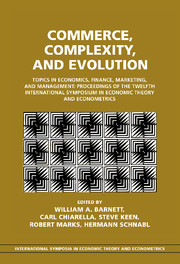 Commerce, Complexity, and Evolution
Commerce, Complexity, and Evolution Book contents
- Frontmatter
- Contents
- Series editor's preface
- Volume editors' preface
- Editors
- List of contributors
- I Philosophical and methodological implications of complexity and evolution in economic systems
- II Finance and the macroeconomy
- 5 The nonlinear economics of debt deflation
- 6 The emergence of complex dynamics in a “naturally” nonlinear integrated Keynesian model of monetary growth
- 7 Stochastic volatility in interest rates and complex dynamics in velocity
- 8 A genetic-programming-based approach to the generation of foreign-exchange trading models
- 9 Hybrid option pricing with an optimal weighted implied standard deviation
- III Market and sectoral dynamics
- IV Marketing and interdependent behavior
9 - Hybrid option pricing with an optimal weighted implied standard deviation
Published online by Cambridge University Press: 05 December 2011
- Frontmatter
- Contents
- Series editor's preface
- Volume editors' preface
- Editors
- List of contributors
- I Philosophical and methodological implications of complexity and evolution in economic systems
- II Finance and the macroeconomy
- 5 The nonlinear economics of debt deflation
- 6 The emergence of complex dynamics in a “naturally” nonlinear integrated Keynesian model of monetary growth
- 7 Stochastic volatility in interest rates and complex dynamics in velocity
- 8 A genetic-programming-based approach to the generation of foreign-exchange trading models
- 9 Hybrid option pricing with an optimal weighted implied standard deviation
- III Market and sectoral dynamics
- IV Marketing and interdependent behavior
Summary
This work is concerned with improving option-pricing accuracy. The seminal option-pricing model is the Black–Scholes model (Black and Scholes 1973). Claims that the Black–Scholes valuation model no longer holds are appearing with increasing frequency (Dumas et al. 1996). In fact, Rubinstein (1985) states that, not only is the model failing, it is becoming worse over time.
The failure of the conventional model has motivated a new option-pricing literature, determined to reconcile these pricing anomalies. Those approaches that hold the most promise make minimal assumptions. Some authors assume that the key to improving pricing lies with modeling the underlying standard deviation (Ait-Sahalia and Lo 1998, Dumas etal. 1996, and Ncube 1996).Others use techniques to fit optimal distributions implied by option prices (Rubinstein 1994, Derman and Kani 1994, and White 1995).
This work shows that significant pricing outperformance is possible with a new hybrid approach. The hybrid approach models the differences between the conventional option-pricing model and the actual transaction data.
The conventional pricing model has only one unknown input parameter – the standard deviation. Although the market's optimal forecast for standard deviation is utilized, persistent and systematic biases are found. The biases are a function of the option's moneyness (i.e., ratio of underlying value to option strike price) and time to maturity. These biases are modeled with artificial neural networks (ANNs). ANNs are a form of nonlinear, nonparametric regression. It is found that this modeling enhances out-of-sample option-pricing performance.
This chapter is organized into four sections. The first introduces key concepts and financial terms, the second section describes the method and data used, next the results are presented, and finally conclusions and further work are discussed.
- Type
- Chapter
- Information
- Commerce, Complexity, and EvolutionTopics in Economics, Finance, Marketing, and Management: Proceedings of the Twelfth International Symposium in Economic Theory and Econometrics, pp. 191 - 212Publisher: Cambridge University PressPrint publication year: 2000


